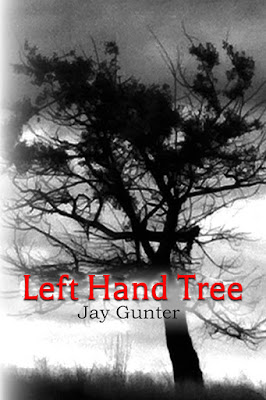Interview: Jay Gunter, author of Left Hand Tree
Q: This is your first book. Where'd you get the idea to do a collection of short stories instead of a full-length novel?
A: I actually like to call the book an “anthology novel.” It started out as a short novel, Left Hand Tree, the first actual story in the book. When I was finished, I wound up writing a number of other stories that took place in the same “universe,” with similar themes. I wanted to publish them all, but story collections are somewhat difficult to sell to readers, especially those who may be used to reading a book that tells just one story, all the way through, with no breaks. My solution was to do what one of my favorite authors, Ray Bradbury did with books like The Martian Chronicles and The Illustrated Man. He created a central story to run through a number of his short stories and he “bound” them all together. The stories in Left Hand Tree were already bound together with recurring mythic images and themes, but I wanted something more tangible than that. Hopefully, the story of a fictional version of myself being contacted by a strange storyteller will keep readers turning pages to the end the book, even after one of the shorter stories within has ended.
Q: How did you begin writing?
A: I’ve written screenplays, poems, short stories and lots of odds and ends--almost none of which sold--especially after graduating as an undergraduate. All throughout that time, I’ve had many bouts of looking at myself in the mirror, so to speak, and asking if I’m just wasting my time. I’ve wanted to write full time since I was in middle school, but it’s easy for me to get into a rut and let the writing dwindle down to nothing. I just wanted to finish and publish this particular book and get it out there, so these crazy ideas I had about horror and monsters and the nature of the universe would be read by someone other than myself and a handful of other people. I did publish the first story in the book, the short novel “Left Hand Tree”, with another small publishing company, but the book, to me at least, felt like it needed the presence of those other stories to give it a framework and a reason for existing beyond just being a strange, gothic crime story with supernatural elements. I conceived the universe of Left Hand Tree to be something strongly within the horror genre, with all that genre’s attributes and attitudes.
Q: What authors do you like to read?
A: I mention them, or I have my mysterious storyteller in the book, mention them. Ray Bradbury with The October Country. Stephen King with ‘Salem’s Lot and Pet Sematary. H.P. Lovecraft and The Dunwich Horror. Also, Arthur Machen, M.R. James and Daphne du Maurier from over across the pond. I also learned to enjoy authors who are considered “Christian” authors, such as C.S. Lewis, J.R.R. Tolkien, Charles Williams and George MacDonald. When I was younger, I never went near Lewis and the Narnia stories, but I developed an appreciation of him and other Christian writers when I saw how they used their imaginations to take those things they loved, those Gothic conventions and mythic images, and expressed their faith through them. I tried to do the same thing with the stories in Left Hand Tree, using the otherworldly whisperings from the Lovecraftian darkness outside of space and time to express my Christian beliefs, rather than elves and lions. My ultimate hope is that I can delight a reader with what Lovecraft termed “cosmic horror” that transports you to realms beyond the bounds of this one, and yet offer a message of strange hope beyond human understanding, where he mostly just dealt with existential despair. I never want to simply depress a reader, but at the same time, I don’t want to be guilty of serving up a Sunday school lesson in a Halloween mask!
Q: Do you have any writing rituals?
A: Nope. Butt in the chair, fingers on the keyboard, keep writing ‘til I’m done. I do write better in silence than with music or background noise, however.
Q: What's more important: characters or plot?
A: Characters are what draw you into a story. Plot is what keeps you there. If either is weak, the whole narrative will suffer. Basically, it’s a 50/50 balance. In the case of the first story of Left Hand Tree, I had a character to begin with, a no-nonsense customer who would stop and nothing to get a job done. I decided to give him a non-typical job, and have him save an infant in peril, rather than recover stolen money or kill someone for revenge. The otherworldly horror elements occurred to me afterwards, and the plot began to weave itself around this tough character. The central character in the second story, “The Fourth Son of Adam,” however, was pretty formless—an everyman. That story’s development was almost exactly opposite. I had the plot in mind first, and I discovered that as the protagonist I created to travel through those events did what he did, his personality, his motives, and his desires all began to develop—to reveal themselves—as the plot took its course. I tend to agree with Stephen King that the best stories write themselves, and that the process is a lot like unearthing something that has lain buried for a long time. And sometimes, when you approach a story like that, you find that the story can take on a life of its own and take you, the writer, to places you never expected to go!
Thanks for joining Forward Scribes, Jay!
*Readers, be sure to like and/or share the Left Hand Tree Facebook page for your chance at this custom-designed necklace!*




Comments
Post a Comment